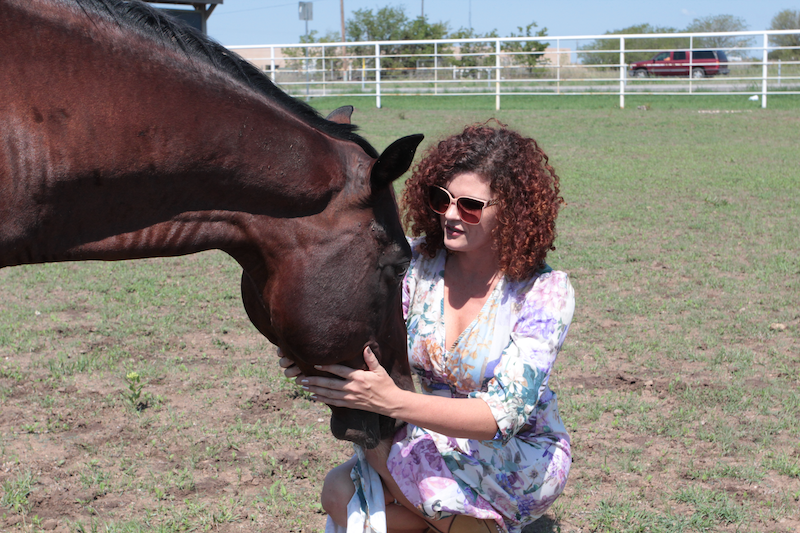2024 Veteran Services Grants
Legendary Slider
Quarter Horse Gelding (2011)
Dr. Hallie Sheade has always believed in the power of equine-assisted counseling to help those for whom more traditional therapy models have not been successful. She and her husband Paul Ziehe, a US Marine Corps veteran, founded the non-profit S.T.E.P.S. With Horses in 2021 to better provide these services to military veterans and their families, at-risk youth, and others with mental health needs, with many clients receiving grant and scholarship-funded services for free or reduced cost. Using a systematic, evidence-based approach to treating mental health, this organization seeks to help its clients not only achieve their treatment goals but also learn post-treatment strategies to maintain their progress and minimize regression.
The term “S.T.E.P.S.” stands for Spectrum of Therapeutic Equine-Partnered Services (STEP Model). This unique approach to structuring the use of equine-assisted services helps clients achieve success through a combination of clinical services, such as equine-assisted counseling or psychotherapy, and non-clinical services, such as therapeutic horsemanship. Today, as many as 70% of the clients visiting S.T.E.P.S. With Horses are veterans or their families. Working mostly in individual sessions with licensed professional counselors, Professional Association of Therapeutic Horsemanship, Intl. (PATH) certified Therapeutic Riding Instructors (CTRI) and Equine Specialists in Mental Health and Learning (ESMHL), and other highly qualified experts, veterans and their families receive tailored support that aligns with their unique needs.
Legendary Slider— “Max” to his friends—was a 10-year-old ex-reining horse when he joined the S.T.E.P.S. With Horses equine staff in 2021. An injury had cut his successful performance career short, but when he arrived at the program, staff quickly identified that his previous lifestyle had left some invisible wounds as well. Max was accustomed to living alone and lacked the equine social skills necessary for success in a herd environment; his interactions with people were primarily tied to performance.
Fortunately, the caring team at S.T.E.P.S. With Horses was able to draw Max out of his shell, and since then, this Quarter Horse gelding has undergone a powerful transformation. Many of the veterans who meet Max immediately understand his journey from isolation to connection, as they too have struggled to reintegrate into civilian life and find community. Despite his progress, Max still remains selective regarding whom he chooses to work with during therapeutic sessions; those veterans he “picks” share the powerful experience of feeling seen and chosen by a thoughtful, discerning animal.
Suzy, an Army veteran who returned from Iraq with deep emotional wounds, immediately connected with Max’s story. Diagnosed with PTSD, Suzy felt isolated and out of place in civilian life; she wondered if she would ever find her footing again. But in Max, she found a fellow being who had also come from a background where his role had been clearly defined and meaningful, only to have that structure be taken away. The day Max approached Suzy and stood quietly at her side, she felt a spark of something she hadn’t felt in a long time—honor, pride, and a sense of being seen.
Whether working in an unmounted counseling session or a mounted therapeutic horsemanship lesson, Max teaches veterans how to communicate with respect and empathy. He helps his riders to see things from his perspective, which translates into increasing their ability to connect with others. One-on-one, Max stays deeply attuned to the needs of each individual. His calm, protective nature offers veterans comfort; in Max, they recognize their own protective instincts embodied in a stronger, more powerful being, providing a sense of trust and support.
But it isn’t just veterans who are impacted by their time in the service. A veteran’s family must often adjust to frequent moves, long deployments, and a loved one who is struggling upon their return. Diego was used to this lifestyle, but as he got older, he became guarded and struggled to make new friends. He became increasingly lonely and frustrated, feeling like he didn’t fit in anywhere.
When Diego first started riding Max in therapeutic horsemanship lessons, some of his frustration and communication challenges spilled over. When Max didn’t do exactly as Diego asked, his feelings of being overlooked or misunderstood came rushing in. But Max didn’t take it personally; when Diego asked for a movement with clarity, the horse responded promptly. If Diego was rushed or unclear, Max wouldn’t budge. Gradually, Diego came to understand that Max’s responses depended on how he approached the horse. This understanding sparked a new awareness in Diego about communication, patience, and the importance of clear signals, lessons that went beyond the arena.
With his remarkable story and unwavering dedication, Max makes a lasting impact on those he works with through creating meaningful, life-changing connections.
